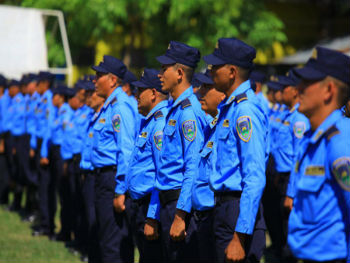A two-month old police reform commission in Honduras has already made significant progress toward cleaning up the country’s notoriously troubled law enforcement institutions, commission members say.
At a June 16 event in Washington, DC hosted by the Woodrow Wilson Center, members of Honduras’ Special Commission for the Purging and Reform of the National Police spoke about their ongoing efforts to root out corruption in the force, as well as some of the challenges they face moving forward.
The special commission was formed in early April through a legislative measure introduced by President Juan Orlando Hernández and approved with broad support in the Honduran congress. The commission was created following revelations indicating top officials in the National Police had participated in a plot that led to the 2009 murder of Honduras’ top anti-drug official.
The legislation (pdf) assigned a time frame of 12 months for the special commission to complete its mandate, which includes assessing the suitability of police officers and making recommendations for structural reforms to ensure the integrity of the force.
Several participants at the Wilson Center event emphasized the importance of the commission’s top-down approach to purging the police. The commission plans to review the entire police structure, starting with its highest-ranking officials.
According to a presentation (pdf) given by commission secretary Jorge Machado, the body has evaluated the 272 highest-ranking members of the police, and it has dismissed, suspended or accepted the voluntary resignation of 110 of those officers — about 40% of those under review.
However, those who remain on the force have not been given a “blank check,” said Machado.
“They are going to continue to be evaluated, both with confidence tests and being subject to public scrutiny,” he said, referring to a new platform called “Honduras Denuncia” (“Honduras Denounces”) that allows citizens to report police misbehavior directly to the special commission.
In situations in which officers are removed from their positions for alleged crimes, the commission plans to refer those cases to other authorities.
“Not being criminal investigators, nor prosecutors, nor judges, we are going to finish our work of sending these files to the appropriate authorities so they can act,” said commission member Omar Rivera.
“We have to create a mechanism so that the police that are coming out of this institution are not a danger to the public,” added fellow commission member Vilma Morales.
Carlos Hernández, who serves as an advisor to the commission, echoed Morales’s point, calling for the Attorney General’s office to create a special unit to handle cases of officers removed from the force.
“We cannot give this an isolated look,” Hernández said. “It has to be comprehensive.”
SEE ALSO: Honduras News and Profiles
The participants also emphasized the commission’s independence from the police as a key factor that differentiates its work from that of past police reform efforts.
“There is no possibility of successful reform if there is not a purging process first,” Rivera said. “Because that only feeds the monster, to be investing resources, to be promoting processes that strengthen the capacities of an organization consisting of people who are not suitable.”
Additionally, the participants stressed the importance of successful police reform in light of the complex security challenges facing Honduras.
“We are committed to strengthening the institutional capacity [of the police] so that it can fulfill its role in a new stage where the participation of citizens is going to be fundamenal to guarantee the full enjoyment of civil rights,” Rivera said.
Security Minister Julian Pacheco, who is also head of the commission, said that reforming the police would also allow the military to step back from their controversial involvement in public safety operations.
“To the extent that we recover spaces with more police, with more capacity, with more techniques, with more knowledge, then the military police will have to disappear from that scenario,” he said.
InSight Crime Analysis
Although the special commission has only been operational for about two months, and despite the fact that it has no official budget, it has arguably already achieved more than Honduras’ past several police reform efforts combined. As Machado pointed out in his presentation, other purges in recent years — which received millions of dollars in funding — focused solely on removing lower-ranking members of the police. And despite evaluating thousands of officers, only a relatively small handful were actually separated from their positions.
It is important to note, however, that Honduras will continue to face challenges related to its police reform efforts going forward. One important question is how authorities will replace the officers who have been dismissed from the force.
According to documents distributed to attendees at the Wilson Center event, the Honduran government is planning to train more than 22,000 new police agents over the next six years. Taking into account the ongoing purge and normal attrition rates, that initiative is expected to nearly double the current number of officers on the force, from around 14,000 to more than 26,000 by 2022.
Unsurprisingly, this ambitious recruitment and training effort will be expensive; the government estimates it will raise the total expenditures of the Security Ministry by $359 million, a 129 percent increase over the 2016 budget. Moreover, other examples of similar hiring initiatives following police purges have demonstrated that finding and retaining qualified candidates is often more difficult than it may first appear.
SEE ALSO: Coverage of Police Reform
Also, as the commission members acknowledged, the body’s independent authorities are limited. It can only investigate, not prosecute, cases of police corruption. The commission will have to rely on the cooperation of Honduran judicial officials, who may be politically disinclined to pursue certain cases.
Nevertheless, the special commission’s track record so far suggests that the Honduran government is taking this iteration of police reform seriously. If the effort ultimately proves successful, it could provide a model for other countries in the region seeking to improve their public safety institutions.

